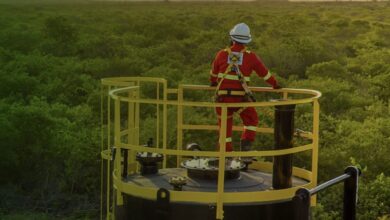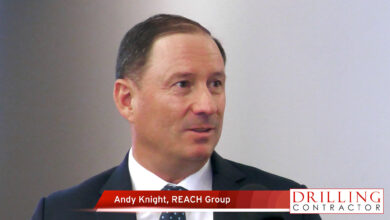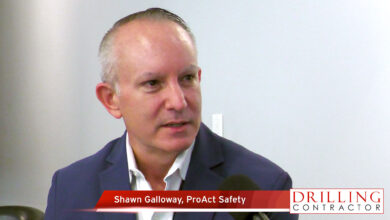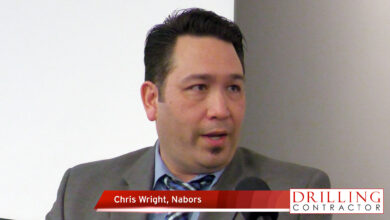Industry panel: Companies must embrace the challenges that will come with the energy transition
With both regulators, investors prioritizing emissions tracking and reduction, drillers and operators must navigate shifting landscape
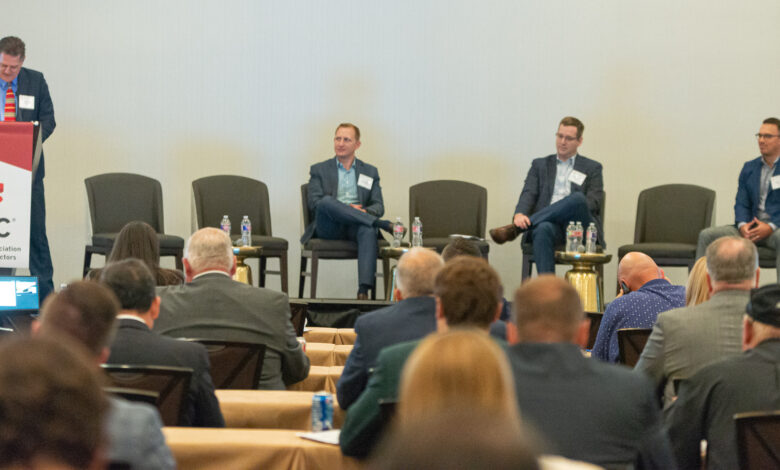
By Stephen Whitfield, Associate Editor
Even while the energy transition has created a host of challenges for the oil and gas industry, operators and drilling contractors are finding that sustainability and profitability don’t have to be mutually exclusive.
“I feel like we can impact the environment and safety most with ESG. We’re working to reduce greenhouse gas emissions and, personally, I see that as an opportunity to lower costs, as well,” said Adam Johnson, Completions Engineer at Murphy Oil. Mr Johnson spoke on a panel session focusing on the energy transition during the 2022 IADC Drilling Onshore Conference, held in Houston on 19 May.
Murphy Oil, which aims to reduce its Scope 1 and 2 emissions by 15-20% from its 2019 levels by 2030, is already switching from diesel to natural gas wherever possible on its frac sites. All of its Canadian operations utilize dual-fuel frac fleets. In the Tupper Montney shale, the company trialed a dual-fuel drilling rig in 2021, and facilities there are being designed without flare stacks so that wells are automatically shut in rather than utilizing an emergency flare. Further, Murphy is using dual-fuel frac fleets in the Eagle Ford and is evaluating electric fracturing fleets.
But switching to natural gas not only reduces CO2 emissions – there are also financial benefits in moving away from diesel, Mr Johnson said. “With our assets, we have fuel gas available on site, and when we use gas we’re paying spot prices, which, especially the last few years, has led to significant savings. Even with certain assets where fuel gas is too rich and we have to use compressed natural gas, the costs are higher than fuel gas but still significantly cheaper than diesel.”

Jordan Buss, HSE Assurance Director at Precision Drilling, echoed the importance for the industry to implement low-carbon solutions in its operations but also noted that it’s really not a new trend. Precision Drilling, for instance, began operating rigs on grid power in the 1990s, he said. In 2020, the company reduced its onsite fuel use by nearly 90% from its grid-powered rigs, compared with similar rigs running on diesel or using bi-fuel power generation. This resulted in an onsite reduction of 10-18 tonnes/day of greenhouse gas emissions for each rig.
In many cases, the energy transition is simply a matter of building on the work a company has already done in the past, Mr Buss added. “We’ve been doing a lot of these things around ESG for years, before it was even called ESG. So, don’t sell yourself short. Take advantage of the things that you are doing. We may need to make a little bit of improvement here and there, but we’ve really done a lot to fulfill what everybody’s asking for.”
Companies also must be mindful of regulations coming down the pipeline, he cautioned, such as those being proposed by the US Securities and Exchange Commission (SEC). On 21 March, the SEC released a draft rule requiring disclosures around a company’s Scope 1, 2 and 3 emissions; any climate-related goals and progress; climate transition plans, if any; climate-related risk assessment information, including transition risk; and climate governance information.
Mr Buss acknowledged that, as regulators, the SEC is a stakeholder, and the draft rule is something the industry is “going to have to deal with” should it pass, but he encouraged companies to engage with regulators if stakeholder interests do not align.
He cited IADC’s response to the draft rule, submitted on 21 April, which called for the SEC to “closely reexamine its proposal,” as an example of such dialogue.
“Whether you’re a private company or a public company, more and more customers are asking us what we’re doing for our emissions and for ESG in general. We’re going to give our customers what they want, but if something is way off base, we’re going to go back to our customer and say, hey, let’s talk about this,” Mr Buss said.
With regulations or without, however, sustainability reporting is going to become a critical element of the industry’s operations moving forward – not just from a regulatory compliance standpoint but also from a business standpoint.
Public companies are under increasing pressure from investors to show progress on net-zero targets, said Dan Romito, Consulting Partner – ESG Strategy & Integration at Pickering Energy Partners. Moreover, private equity capital has been harder to come by because investors prefer to invest in businesses that are perceived to be “sustainable.”
In particular, he noted that BlackRock, Vanguard and State Street – the so-called “Big Three” of the passive index fund industry – have been “on a tear” for climate-related low-carbon investments. BlackRock is requiring that companies report in accordance with the Task Force on Climate-related Financial Disclosure (TCFD) framework, as well as net zero-aligned business plans that are consistent with their business model. Starting this year, it is encouraging companies to demonstrate that their businesses are resilient under likely decarbonization pathways and the global aspiration to limit warming to 1.5°C, in accordance with the Paris Agreement.
State Street said it may take action against companies that do not provide sufficient disclosure in accordance with the TCFD framework, including climate-related risk, total Scope 1 and 2 emissions, and targets for reducing emissions. Vanguard updated its 2022 voting policy to cover social and environmental risk, including climate change.
In this type of environment, Mr Romito said embracing sustainability reporting will be critical to a company’s survival. While sustainability reporting won’t “guarantee that you’re going to get capital, but the companies that don’t will solidify their place as a laggard and definitely put themselves in a more difficult position to win capital. If you’re going to incorporate that strategy (of reporting ESG data), there’s got to be a sense of urgency.” DC

